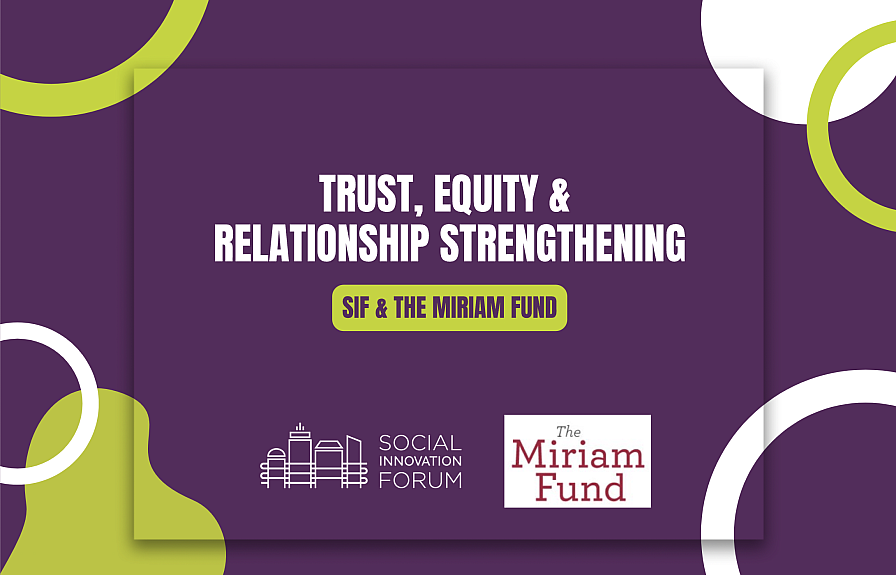
In October 2022, the Social Innovation Forum (SIF) Funder Education program embarked on a partnership with The Miriam Fund, a women’s giving circle founded almost 25 years ago. They are a unique grantmaking entity under the umbrella of Combined Jewish Philanthropies (CJP). Composed of approximately 130 members, The Miriam Fund focuses on supporting and uplifting women’s and girls’* issues across three main buckets – local Jewish organizations, local secular organizations, and organizations based in Israel and has invested an aggregate of over 5 million dollars since its inception.
In short, they are a diverse group of women who came to us ready to engage in more learning about how to equitably support current and future grantees.
SIF’s Funder Education program endeavors to start and facilitate conversations about how funders across the sector can and should engage in accessible philanthropy rooted in equity and inclusion. We’re building our program to be widely approachable by a number of different philanthropic stakeholders, accessible to folks all along the spectrum of readiness to learn about and eventually practice more equitable grantmaking.
The opportunity to work with the Miriam Fund created space for us to explore what it looks like to design and facilitate tailored programs focused on the specific needs of a group or community. It allowed us to take a deeper dive beyond just theoretical discussion (breadth) and into thoughtful dialogue about tangible, transformative strategies for practicing equity-focused grantmaking (depth).
Trends in Grantmaking
In our first session with The Miriam Fund, an in person kick-off event for their upcoming grant cycle, we heard from Susan Musinsky, SIF’s Executive Director, about how grantmaking and the philanthropic sector have shifted over the years. Susan spoke to the ways in which philanthropy, borne of market failures and pressing societal needs, has and continues to fund innovative solutions to emergent social issues.
Susan’s presentation, followed by a panel discussion of myself and two The Miriam Fund grantees – Rachel Eisen of Mayyim Hayyim, and Sunindiya Bhalla of Roca, Inc. – highlighted the foundational elements of trust and deep relationships between funders and grantees as integral to the continued success of both the philanthropic and nonprofit sectors.
The Importance of Using an Equity Lens
In November, Susan and I met virtually with The Miriam Fund members to talk about how to apply a strengths-based approach and use an equity lens when reviewing grant applications and attending site visits (virtual and in-person) with potential grantees. We heard from The Miriam Fund members about their experiences in this work, and ways in which they have shifted practices to better center the applicant experience.
Equitable Evaluation: When and How to Center Nonprofit Values
We were joined by Julia Gittleman of Mendelsohn, Gittleman and Associates, LLC in January to talk about ways evaluation and impact measurement can be used more effectively and equitably. Julia talked about the importance of data for process evaluation and improvement, how qualitative data is just as valuable as quantitative (if not more so), and how nonprofits should lead the conversation on what they’re measuring and what their metrics are.
Julia was joined by a panel of The Miriam Fund partners, including grantees Stacy Malone, Executive Director of the Victim Rights Law Center, and Nancy Kriegel, Executive Director of Yad Chessed; and Shani Wilkes, Associate VP of Research & Evaluation at CJP. The panelists spoke about their own experiences with measurement and evaluation – how to navigate power dynamics and the importance of mutual trust and accountability.
Trust is a Two-Way Street
The common thread running through all three of our conversations with The Miriam Fund and their grantees and partners was that trust is the bedrock of this work. Funders and grantees alike must invest energy into building and sustaining relationships founded on trust and accountability in order to collaborate on impactful social change.
We at SIF are grateful to the Miriam Fund, including Director Beth Tauro, for creating this opportunity for our two organizations to learn from and alongside each other, thereby strengthening our relationship and establishing mutual avenues of trust. In the spirit of SIF’s core values of continuous learning and deep relationships, we hope to continue engaging in such opportunities with our partners in this work.
To learn more about SIF’s Funder Education program, or to inquire about similar such opportunities for you and your foundation/organization, please contact Aditi Dholakia, Funder Education Program Manager, at adholakia@socialinnovationforum.org.
 Social Innovation Forum
Social Innovation Forum